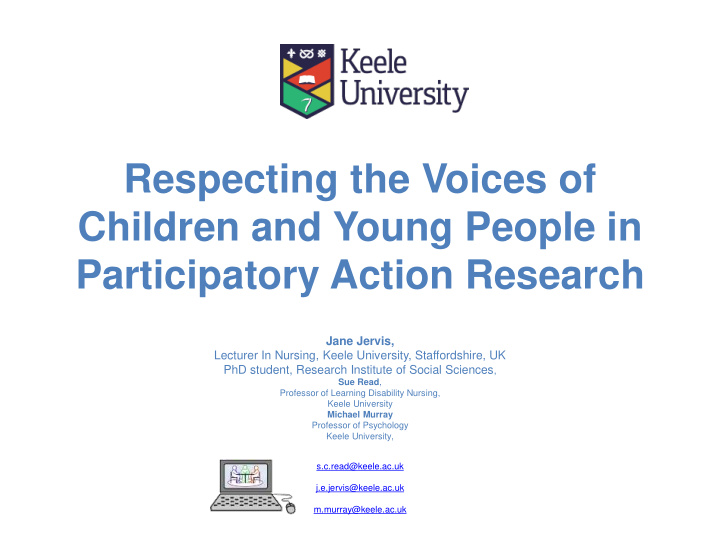



Respecting the Voices of Children and Young People in Participatory Action Research Jane Jervis, Lecturer In Nursing, Keele University, Staffordshire, UK PhD student, Research Institute of Social Sciences , Sue Read , Professor of Learning Disability Nursing, Keele University Michael Murray Professor of Psychology Keele University, s.c.read@keele.ac.uk j.e.jervis@keele.ac.uk m.murray@keele.ac.uk
Where am I from….. Staffordshire is in the Midlands area of England. It is 4581 miles from Vancouver.
Aims are to… • Introduce the background and rationale for my PhD research project • Discuss how children and young people were involved in the research • Explore what was gained from this consultation and collaboration ‘Healthcare is everybody’s business’
My Journey…Towards the PhD MSc – Children: Critical Perspectives Experience in MAU & Cardiac Arrest Team ‘Sudden Death’ Chapters PhD PAR study to improve support provided to children and their families when visiting relatives in hospital
What did we know …… Often not included in conversations at the hospital. Leads to an increase in anger and fear . Need information, reassurance, expression of feeling and the opportunity to be involved Often poorly informed , unaware that death is anticipated, poorly prepared. Study 5-15 year olds – questions to doctors were seeking reasons and cause for death (Thompson and Payne, 2000)
Involving children in research Great importance on children’s participation in healthcare research (Fleming and Boeck,2012) Young people involved in the research process ‘ can offer a different perspective ’ (Kirby, 2004). User/carer involvement across the research continuum is crucial to ensure it remains ‘fit for purpose ’ (Read, 2013).
Research objective A Participatory Action Research (PAR) study to improve the support provided to children and their families when visiting adult relatives in hospital.
My PhD dilemma The main dilemma during the planning stages was whether to and where to include children in the research process.
Consultation and Inclusion • Contact was established with the West Midlands Medicines for Children Research Network (MCRN) User Involvement Coordinator: • who asked the Young Persons Advisory Groups if they would provide consultation for my PhD research proposal • Two consultations were held…
Process of inclusion 1. The first consultation was a focus group of young people from the West Midlands MCRN Young Persons Advisory Group (n=15; three boys and 12 girls, aged between 10 and 17 years). 2. The second focus group incorporated members of the London and South East MCRN Young Persons Advisory Group (n= 8, four girls and four boys aged between 8-17 years).
Process of inclusion They were asked: • What experience they had of visiting adult relatives in hospital • What support might be required • For suggestions regarding communicating with children and young people
Process of inclusion They were asked: • whether I should approach any children who visit an adult relative at the hospital • whether I should use other children’s groups (MCRN, schools, clubs) to receive feedback on plans/leaflets during my research .
Hospital experiences Few had had Several young people had explanations from visited relatives in medical staff about hospital. All were elderly their relatives and mostly condition Grandparents Three had had no explanation from relatives or staff
Encounters with nurses/doctors They sat down and talked to me, saying he (relative) was going to be alright. It made it easier when I had my mum with me They did not have We felt in the time to talk to us way They were rude and showed no compassion
What did not help Leave you waiting outside When they said I getting panicked couldn’t go in Nobody spoke to me about where to go
Process of inclusion: informing research methods • After discharge would be better, but not if the relative had died • Thought it best to speak to different groups, but be careful as some children may not wish to talk about their experiences • Don’t visit schools and pick out kids who have visited adult relative's as it is a sensitive topic
Process of inclusion: informing research methods • Not when visiting relatives at the hospital • After they have seen their family member if the child is emotionally stable • Don’t use questionnaires, ask questions face to face
Process of inclusion – An unexpected development • Exciting • Successful Focus Group • Want further participation with the hospital….
Young people involved in the research process ‘can offer a different perspective’ (Kirby, 2004)
On reflection … Engagement of children and young people in research is an important and expanding area The experience has influenced my clinical practice and now my teaching practice Care must be taken in relation to research design, the research process Care is also required in the preparation of those children and professionals involved.
“ Children are a part of the social world and without their perceptions and experience's being documented, we gain a partial view, and an inaccurate perspective” (Butler, 2012, p72)
References • Butler, V. (2012) An exploration of how ethics inform the design of social research with children under 11 years of age. IN J. Fleming, & T. Boeck, (Eds) Involving children and young people in health and social research. London: Routledge • Fleming, & T. Boeck, (Eds) (2012) Involving children and young people in health and social research . London: Routledge. • Kirby P (2004) A Guide to Actively Involving Young People in Research: For Researchers, Research Commissioners, and Managers . INVOLVE • McLeod, J. (2001). Qualitative research in counselling and psychotherapy . London: Sage Publ. • Read, S (2013) Facilitating bereavement support for people with intellectual disabilities in England IN J. Hockley, K. Froggatt, & K. Heimal (Eds) Participatory research in palliative care . Oxford: Oxford University Press.
Thank you for Listening. Any questions ? Jane Jervis Lecturer in Nursing PhD Student School of Nursing & Midwifery, Keele University, Staffordshire, UK. j.e.jervis@keele.ac.uk
Recommend
More recommend